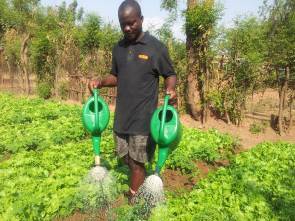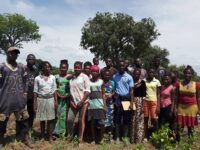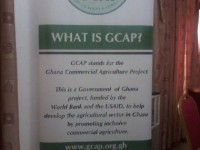 Residents of the Upper East region have expressed fears 2017 may unleash a degree of food insecurity severe enough to push several households over the edge.
Residents of the Upper East region have expressed fears 2017 may unleash a degree of food insecurity severe enough to push several households over the edge.
Public anxiety about the hunger ahead follows some natural disasters that left some farmlands with poor harvests in 2016. Acres of croplands, estimated in thousands, were washed away in more than a half of the region’s 13 municipalities and districts.
The affected areas, where 1,467 children were among some 2,718 people displaced after no fewer than 450 houses, according to the National Disaster Management Organisation (NADMO), got submerged in tidal waves, included Bongo, Bolgatanga, Kassena-Nankana East, Builsa North, Kassena-Nankana West, Builsa South, Nabdam, Bawku West and Talensi. The livestock that got missing in the unstable belly of the blind floods were numberless.
“As I’m talking to you today, there are households that cannot even get their breakfast, not to talk about their three square meals a day. The year started with floods that [engulfed] the farms and when the farmers thought they could reorganise after the heavy rains, the [rain scarcity] came in. The aged are feeling the suffering more,” a resident, Ayeoh-duko Akobulgo-zotipelba, told Starr News in Bolgatanga, the regional capital.
“If I remember very well,” said Matilda Ayine, a teacher, “I think about 40 bridges and many roads were destroyed in the region when the floods came. It affected some farmers too as they could not cross over to their farms. My worry is the fact that the disaster will cause the market prices of food to rise next year. It doesn’t look good. It doesn’t look good.”
Development watchers say the looming situation promises a more crushing impact for the vulnerable class with a disturbing number of women and children likely to migrate in its wake to the cities to survive.
*CSOs want all funerals suspended to avert impending famine
Although natural disasters, such as flooding and erratic rainfall, and the twin troubles of poor harvest and food shortage are familiar misfortunes in the region, anxious residents already see the approaching crisis as another hunger period too many in a decade of recurrent tragedies.
Concerned civil society organisations and independent observers are of a strong voice that local funeral performances- occasions that invariably see barns drained and animals killed to pacify ancestors and to refresh guests- should be suspended across the region to minimise the burden of the looming bang.
“You don’t need an expert’s advice to conclude that we will be in crisis next year. In other words, there will be famine next year. The floods were so excessive that the water was too much for even rice that needs enough water. The farming in the region is mostly on subsistence- just to farm, harvest and feed- and the foodstuffs do not last more than 90 days. And those who even have it lasting up to 90 days are lucky. That is why you find the youth from Upper East, Upper West and Northern Region trooping to the southern sector to look for non-existent jobs.
“We cannot be complaining all the time. We cannot stop funerals; they are part of our culture. What traditional authorities, assembly men and women and other opinion leaders should do is to place a moratorium (suspension) on funeral performances. Funerals don’t rot. We can together say ‘no funeral performance next year’ to mitigate anything that can crop up,” a popular advocate for social justice and Upper East Regional Chairman of the Ghana Coalition of NGOs in Health, Noble Asakeya Alagskomah, told Starr News in Bolgatanga.
*Experts highlight “food sovereignty”in famine-stricken areas
Should the region eventually find itself where it would need external food aid in 2017, experts have cautioned government and donors against disregard for what they call the “food sovereignty” of the intervention areas.
Professor David Millar, President of the Millar Institute for Trans-disciplinary and Development Studies, told Starr News free supply of foodstuffs in hunger-stricken areas not used to the types of stuffs donated had always failed. Such interventions, he stressed, mostly had ended up in the disaster survivors selling off the food items they “do not eat” to buy what they “call food”.
“One concept that is important to discuss even at policy level is what we refer to as food sovereignty. And food sovereignty is the right to determine what is food. For example, if you go to some parts of the north here, food is TZ (tuo zaafi- a product of maize or millet). Rice is not food. They will tell you rice is not food- or rice is for children. If you go to some parts of the south, plantain and cassava is food- rice is not food.
“So, if you don’t treat the issues of defining what food is, you would end up with people just looking at- oh, they are food-insecure; let’s send them rice, or let’s send them wheat. But the people do not eat those. Provide the food aid and you’d find the food in the market. You’d say people are selling the thing. Yes. That is not food for them.
So, the agenda is to transform that into cash and use the cash to buy what they call food,” the former Pro-Vice Chancellor of the University for Development Studies, who pointed out that the level of food insecurity in the region next year might not be as overwhelming as to warrant any external food-aid intervention, emphasised.





